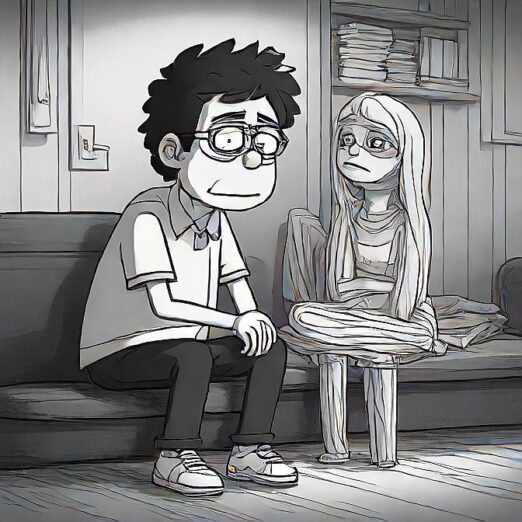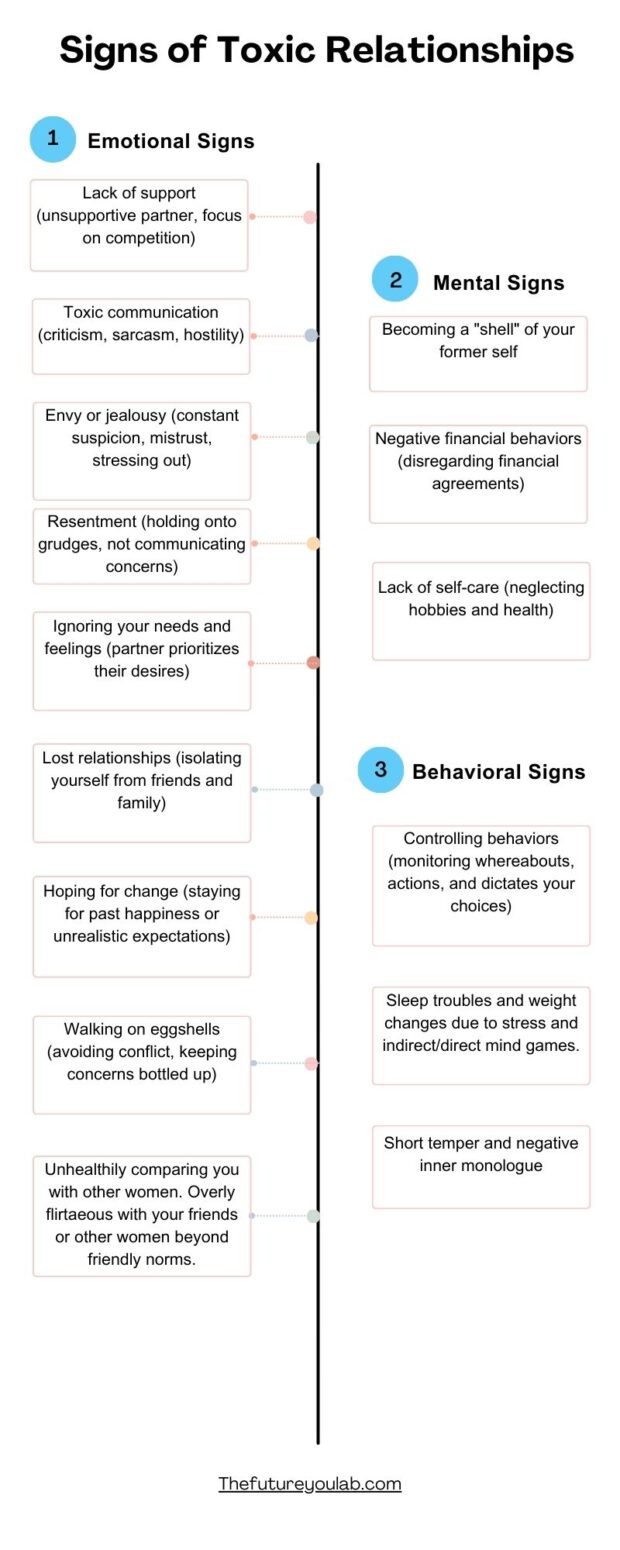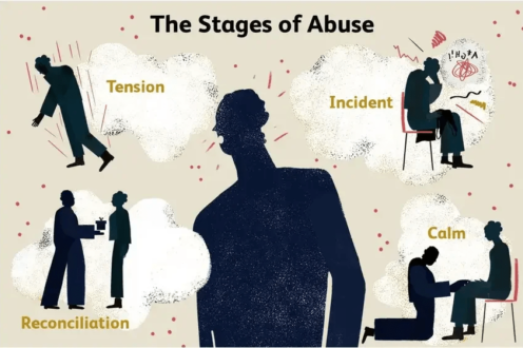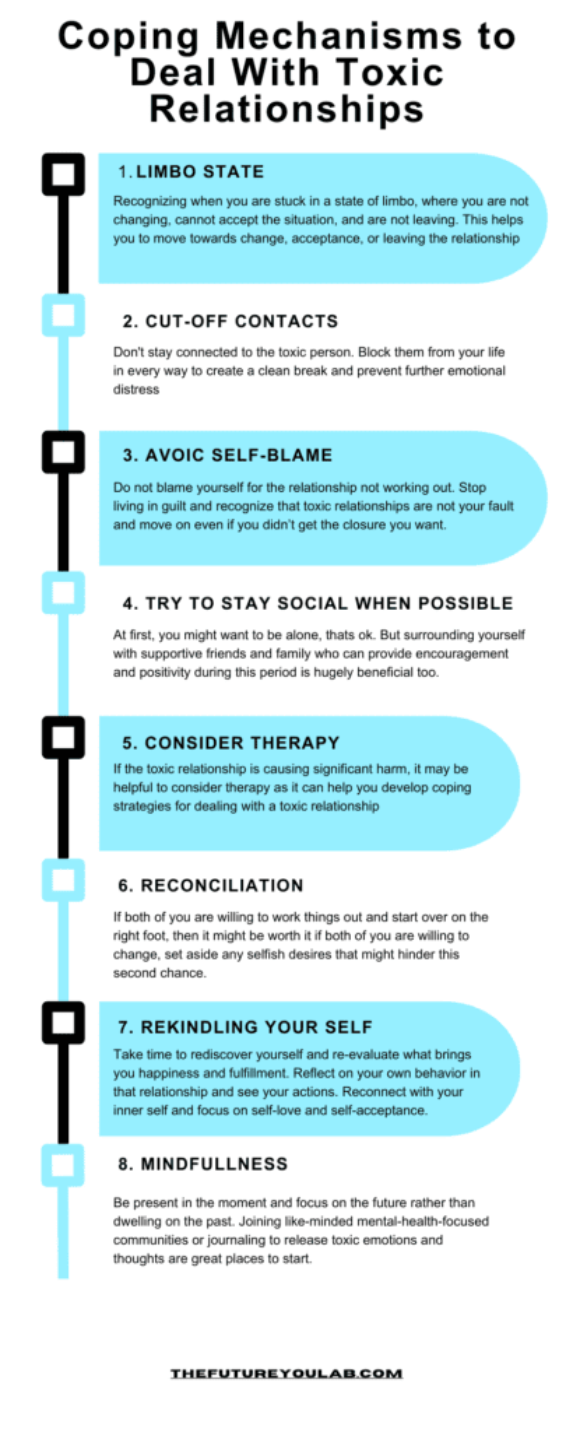Toxic Relationships in Millennials 101: A Guide to Wake the Hell Up
Introduction
Millennials, let’s talk about toxic relationships. (like seriously).
We Millennials are more likely to attract emotionally unavailable partners than other generations.
Can you believe that?!
We’re the avocado toast generation, the side hustle hustlers, the champions of #selfcare.
But when it comes to relationships, most leave us feeling more like a deflated pool float.
Is constant negativity the new normal for you?
Do movie nights feel more like fight nights to you?
Are you constantly walking on eggshells, worried about setting off your partner?
If you’re nodding your head like you’re at a concert, then this guide is for you.
This guide is packed with scientific findings, examples, and solutions all designed to help you truly assess your relationship and make the right call.
And most importantly, to have inner peace with your feelings.
As a Millennial myself, I’m not here not here to judge or throw shade (although, some red flags deserve a major side-eye).
So, let’s get started.
What Is a Toxic Relationship
A toxic relationship, from a scientific perspective, is characterized by two major things: reactive behaviors and unhealthy communication patterns.
This creates a situation where either you and/or your partner experience significant negative emotional and psychological consequences.
This is the smart definition.
Before I share a more relatable definition for you to clear it further, you need to understand what these terms mean.
Reactive behaviors are impulsive and emotionally charged responses to situations.
They often escalate conflict and lead to further negativity.
To give you an example of how this goes wrong:
You and your partner plan to watch the new rom-com everyone’s talking about.
You: (excited) Movie night! Popcorn ready?
Your partner: Ugh, another predictable rom-com? Can’t we watch something more intellectual?
You (already annoyed): Just say you don’t wanna cuddle.
A perceived loss of control or dominance triggers these behaviors in a toxic partner.
And if anything we learned about unhealthy partners, they must be in control all the time.
Unhealthy communication patterns on the other hand include behaviors like criticism, sarcasm, or stonewalling (refusing to communicate).
These behaviors damage trust between you and your partner and make it difficult to resolve issues constructively.
In other words, your relationship might feel like an episode of Jerry Springer than a romantic novel.
Now to put it all in simple terms for you to remember:
A toxic relationship is basically one where you or your partner focus on satisfying your ego and enforcing your point of view.
This goes against the 4 main pillars that can make your relationship much healthier.
These are respect, ego-free communication, trust, and partnership (not my way or the highway).
1.1 Examples of Toxic Relationships
Romantic:
- The Possessive Partner: Constantly checks your phone, monitors your whereabouts, and gets jealous of your interaction with others.
- The Drama King/Queen: Your partner create unnecessary conflict, thrive on chaos, and use emotional manipulation to get their way with you.
- The Hot and Cold: He showers you with affection one minute and gives you the silent treatment the next, leaving you confused and insecure.
- The Stonewaller: Your partner refuses to communicate openly, shuts down during arguments, and avoids addressing problems.
There are many feelings that come at this stage.
Some common ones like jealousy, physical or verbal abuse, constant criticism, belittling, anger, isolation, gaslighting withholding affection, and possessiveness
Family:
- The Critical Parent: Your partner belittles your achievements, focuses on your flaws, and makes you feel like you’ll never be good enough.
- The Enabler: He accepts and covers a family member’s bad behavior which prevents them from taking responsibility for their actions.
- The Emotional Blackmailer: Your partner uses guilt trips, threats, or emotional manipulation to control you.
- The Distant Relative: You have a relative who offers no support, puts you down subtly, and makes family gatherings stressful.
(When was the last time you skipped dinner because one member you hate was there!)
The overall feelings here are emotional manipulation, guilt-tripping, constant criticism, and controlling behavior.
Friends:
- The Fair-Weather Friend: Your friend is only there for you when things are good but disappears when you need them most.
- The Gossipmonger: She Spreads rumors about you or others, stirring up drama and negativity in the friend group around you.
- The One-Upper: Always has to have a better story that yours, belittles your experiences, and makes everything a competition.
- The Taker, not the Giver: Well, it’s that friend who just takes advantage of you and doesn’t reciprocates favors and shows no genuine interest in your life.
The overall feelings here are betrayal, resentment, confusion, isolation and drama exhaustion
Workplace:
- The Micromanager: A co-worker of yours who constantly monitors your work, distrusts your abilities, and stifles your creativity.
- The Bully: A colleague who belittles you in front of colleagues, takes credit for your work, and creates a hostile work environment.
He undermines your reputation, throws you under the bus to save themselves, and takes credit for your ideas. - The Slacker: The worker who takes advantage of your good nature, dumps their workload on you, and expects you to pick up the slack.
The overall feelings here are burnout, reduced confidence, stress and anxiety, frustration, and job insecurity.
1.2 Who Are Most Susceptible to Toxic Relationships?
- you have chronic ADHD, a history of violence and exposure to dysfunctional family dynamics.
- you have mental disorders such as bipolar disorder and depression, and weak boundaries do play a role.
– May take advantage of you to achieve their own goals
– May be very critical of you while needing constant praise for themselves
– Can be charming and charismatic at first, but this is often a facade.
– May be unable to see things from your perspectives which can take a problem to the next level.
– May be easily offended and react with anger or rage if you say or do something that’s not serving their nature.
Sociopaths, on the other hand, may not have any mental health diagnosis or antisocial personality disorder (ASPD).
They may exhibit impulsive behavior with you and deceit, which are not usually shared by narcissists.
Can it get much worse?
Yes, when you combine these two together.
Combining these traits can lead to a toxic personality type known as a narcissistic sociopath or malignant narcissist.
– May frequently break the law or social norms
– May be prone to lying and conning you and others
– May have a history of unstable relationships
– May struggle to hold down a job or maintain shared responsibilities

Signs of Toxic Relationships
Toxic relationships can manifest in various ways.
Here is a breakdown of the most common signs your partner may go into.

Now the question you might have in mind is:
What type of action or behavior Millennials tend to do that leads our partner to feeling these signs?
Many research suggests that this happens when Millennials tend to exhibit the following actions:
- Relationship Scorecard: Your partner is Keeping score of past mistakes and using them to blame or manipulate you.
This toxic behavior can create a cycle of guilt and bitterness around you, rather than solving the present issue. - Passive-Aggression: This is when your partner starts dropping hints or making sarcastic comments about you instead of directly addressing issues.
This can create misunderstandings and resentment in your relationship as you might expect. - No Respect, Trust, and Affection: If you prioritize love over respect, trust, and affection in your relationship, then you need to reconsider.
This can make you tolerate disrespectful or abusive behavior, lying, or even cheating all under the name of love.
Love is not what keeps a relationship lasts. - Fear of Commitment: Millennials’ fear of commitment can lead to unstable and unhealthy relationship behaviors, such as masking jealousy as affection.
If you or your partner are not into committing, this can lead to a vengeful mindset, and encourages unfaithfulness.
There are many reasons for that but it is a story for another time. - Insecurity, Self-Centeredness, Dominance, Control, and Fear for One’s Safety:
These toxic relationship traits can create an unhealthy and abusive environment for you to thrive at. - Lack of Self-Esteem and Imbalance of Power:
A toxic partner may strip away your self-esteem and create a clear imbalance of power in the relationship.
This leads to controlling and excessively jealous behavior between you two. - Buying the problem out: This is straightforward; you have a problem that you should deal with together.
But instead, you brush it under the carpet by showering them with gifts and gestures without addressing the root cause.
Picture this: Your partner keeps forgetting your birthday, anniversaries, even your cat’s name.
Every time, he scramble to “make it up to you” with a grand gesture – a weekend getaway, a designer bag.
You feel momentarily appeased, But guess what?
The core issue, his lack of attention, remains.
Now you’re stuck in a cycle of manufactured excitement followed by inevitable disappointment.
You become a human participation trophy, and he’s a master of deflection, never actually addressing the root of the problem.
Fun times, right?
(It feels like I’m ratting out my generation and they are after me!)
Unless you crave the drama of ‘situationships’, it is important to talk.
Toxic Relationships VS Abusive Relationships
Toxic relationships and abusive relationships are often used interchangeably, but they are not the same.
Toxic relationships involve harmful behavior caused by you or your partner.
This causes you emotional harm such as criticism, belittling, manipulation, and obsessive control.
These behaviors can manifest in your relationship as emotional, physical, and sexual abuse.
All of which can leave you feeling helpless, insecure, and traumatized.
On the other hand, abusive relationships take various forms such as physical violence, assault, emotional abuse, and financial control.
Here, you often feel powerless, isolated, lied to, and trapped, fearing retaliation and further harm from your partner.
On the surface, abusive and toxic relationships look the same.
However, the main difference is the level of control and deliberate harm.
Abusive relationships involve deliberate harm and control by one partner over the other.
Toxic relationships involve harmful behavior that can cause emotional harm.
Both can have long-term effects including damage to self-worth, anxiety, and mental health issues such as depression and (PTSD).
According to research, these relationships leave us in chronic stress as you might expect.
This increases your chances to chronic inflammation and the risk of other health problems.
You may feel emotionally drained, undervalued, misunderstood, demeaned, and even abused.
All of which are such unfortunate events you had to go through due to your partner’s behavior.
You might ask yourself; why they keep doing that?
There’re a few reasons for that.
It all goes back to their childhood, past exposure to unhealthy behaviors or relationships and unhealed attachment wounds.
(Topics I covered in other posts).
Drugs also play a role here.
The sad thing here is that you might tend to question yourself every time you get rife and abuse from your partner.
Stick to the facts here.
See things as they’re and don’t come up with excuses to such behavior.
Now this leads me to the most important question.

Why Do Couples Stay in Toxic Relationships?
There are several reasons why you might stay in toxic or abusive relationships.
Some of these reasons include:
- Fear: Fear is a significant factor that keeps couples in abusive relationships.
Your fear of retaliation, of being alone, of the unknown are some reasons why you might stay. - Normalized abuse: If you grew up in an environment where abuse was common, you may not recognize that your partner’s behaviors are unhealthy toward you.
You may even believe that your partner’s behavior is normal or acceptable. - Shame and blame: You may feel ashamed or embarrassed about being in an abusive relationship.
You may blame yourself for the abuse or believe that you deserve it which makes it difficult for you to leave the relationship. - Intimidation: Abusers may use threats to intimidate you into staying in the relationship.
These threats can be verbal, or physical, or involve the spread of your personal information or secrets. - Low self-esteem: Abusers often erode your self-esteem over time, making you believe that you are worthless or unlovable.
- Lack of resources: This is sadly quite common in our modern generations.
You may stay and accept all this toxicity because you might be financially dependent on your abusive partner. - Cultural context: Traditional customs like gender roles, power dynamics, and family honor can make it difficult for you to leave an abusive relationship.
- Immigration status: This is sadly not often talked about but it is factual.
Undocumented individuals may fear that reporting their partner will affect their immigration status, making it difficult for them to leave the relationship.
This is especially the case if you had left your country and everything you know behind. - Hope for Change: You may hold onto the hope that the your partner will change their behavior at some point.
You tell yourself that if you just keep your head down and follow what you’re told to do, things will change. - Cycles of abuse: The cycle of abuse often involves periods of calm or apologies from your partner followed by more abuse periods.
This can lead you to believe the situation is manageable or temporary.
The cycle of abuse (aka the circle of violence) often follows the following pattern:

Types of Toxic Relationships
Toxic relationships can come in many formats.
The following are some types of the most well-known toxic relationship patterns you might face:
- Controlling: This type of relationship involves you dominating your partner and vice versa.
By dominance here I mean your partner exert excessive control over your thoughts, actions, or decisions.
They may manipulate, intimidate, or isolate you, leading you to loss your sense of individuality and freedom. - Emotionally Abusive: Emotionally abusive relationships involve constant belittling or demeaning by your partner and undermining your self-esteem.
This can include criticism, gaslighting, and emotional manipulation. - Codependent: Codependent relationships are when you and your partner rely on each other for your happiness.
This leads to an imbalance of power and low self-esteem for both of you. - Neglectful relationships involve emotional neglect, where it is all about your partner’s world and ideas with little to no regard for yours.
- Conflict-Ridden: (I like to call this the housewife reality show drama). This type of relationship is just frankly annoying and uncalled for.
This is when you have constant arguments and disagreements about minor issues causing unneeded stress for you. - Toxic People: According to psychotherapist and clinical supervisor Cathy Press, there are five types of toxic people in relationships.
These are The Charmer, The Controller, The Critic, The Cynic, and The Drifter.
They are masters of passive-aggressive behaviors, manipulation, and control. - Downward Spiral Relationships: These relationships suck and poison your life flat out.
It takes from your general well-being, often presenting some good moments to dupe you into staying.
This ties back to the cycle of abuse I mentioned in the previous section and the conflict-ridden type.

How to Deal With Toxic Relationships
Adulting is hard, but dealing with a toxic partner shouldn’t be.
Here are some tips and ideas for you to consider:
- Acknowledge the Problem: Recognize that you are in a toxic relationship and that changes need to be made.
- Identify the Toxicity: You should recognize the signs of a toxic relationship, such as constant negativity, manipulation, cheating, or abuse that I laid out earlier.
Millennials are the first generation to openly talk about toxic relationships.
So don’t be afraid to acknowledge the issue and seek help. - Set Boundaries: Establish clear boundaries to protect yourself from further toxicity.
Boundaries communicate to others how you want to be treated and help meld relationships around respect and mutual caring. - Write Down Your Core Values: Define what you want in life and why it’s important.
The same applies to your relationship.
This can help you determine whether your relationship aligns with your personal values and needs. - Stay calm and stick to the facts: It is essential for you to remain calm even if your partner tries to provoke you so you can avoid escalating the situation.
Also, focus on what actually happened to you,
This is key because your partner might try to sketch weird scenarios to shift the blame off onto you. - Refuse to negotiate with terrorists: When dealing with a toxic partner, remember that you are not engaging in a normal conversation.
Toxic people are not interested in a win/win situation based on mutual interests.
They are out to make you feel like a loser so they can feel like a winner. - Know what you want first: Before you engage in a discussion, remember one key thing:
Spend your time thinking about ways to get what you want rather than creative ways to argue for what you want.
This can help you communicate more effectively. - Leave the relationship: If the relationship is causing significant harm or is beyond repair, just leave even if you don’t get closure.
This can be a difficult decision, but it is necessary to protect your well-being.
Remember, you don’t get what you attract, you get what you accept. - Document everything: In some cases where things are very tense, if you are experiencing bullying or aggressive abuse, document everything!.
Writing down the date, time, and details of each incident, including any witnesses, can be helpful if you need to escalate the situation to legal authorities. - Reach out to the right support organizations: If youve ever had sexual harassments or been the victim of such, Id recommend reaching out to Helping Survivors.
Helping Survivors is an advocacy center and partner of RAINN dedicated to assisting anyone who was affected by sexual assault or abuse.
Their website offers resources for survivors and their families, with ongoing additions of helpful information like legal help and supports.
Coping Mechanisms to Deal With a Toxic Relationship
This is a reminder that this is your chance to prioritize YOU.

Conclusion
My fellow Millennials and Gen Z, I feel you.
Toxic relationships can be taxing and hurtful for us who think and approach things differently than the other generations.
We usually wear our hearts on our sleeves and crave authentic connections.
I hope this blog has helped you understand more about the signs, behavior and types of toxic relationships to be aware of.
It is never too late to break free and prioritize yourself and emotions for a healthier more fulfilling relationship.
If you enjoyed this post, please consider sharing it with your friend or someone who might need to learn more about the topic 🙂
I’d greatly appreciate it as this will encourage me to carry on with my mission with your support.



